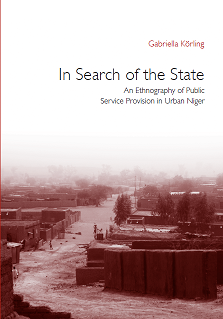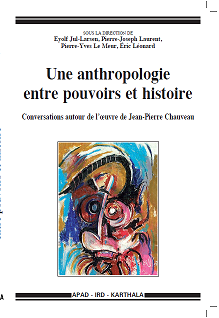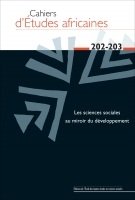
par Admin-Apad | 31 Mar 2015
Körling, Gabriella. 2011. Uppsala Studies in Cultural Anthropology 51. Uppsala: Acta Universitatis Upsaliensis.
This study explores public health and education provision in Niamey, the capital of Niger, by merging the ethnographic study of public services with and anthropological analysis of the state and the local politics. Based on anthropological fieldwork carried out in a group of neighbourhoods in the periphery of Niamey, the study highlights the political dimensions of public service provision in a local arena where international developmnet intervention and national plans meet local realities and where a wide range of actors and institutions, discourses, meanings, and practices are mibilized in the offering of and the regulation of access to public services. It focuses on the political, economic, and socio.cultural aspects of public service provision, too often hidden behind contemporary buzzwords of development such as community participation and decentralization that dominate global debates about education and healthcare in developing countries. The study brings forth the strategies of urban residents in dealing with daily challenges in the consolidation of service provision and in education and health-seeking trajectories. It shows that access to a satisfactory tretment of illness or a successful school career is premised on the ability to navigate on the medical and education markets, which are made up of a plurality of providers and of official and unofficial costs and transactions. Futher, these public services engage different actors such as community committees, traditional chiefs, local associations, emergent leaders, NGOs, and international development aid. The study demonstrates that despite the uncertainty of state support in health and education provision and a widespread dissatisfaction with these public services, the image of the state as service provider is reproduced on a day to day basis through local efforts at securing public services.

par Admin-Apad | 31 Mar 2015
(eds) E. Jul-Larsen, P.-J. Laurent, P.-Y- Le Meur et É- Léonard. Paris: Karthala, APAD & IRD.
Au cours de plus de quarante années de recherches, d’enseignements et de débats scientifiques, Jean-Pierre Chaveau a, dans mes échanges directs comme par ses écrits, influence la facon de penser d’une foule de chercheurs et de practiciens du développment. Ses travaux ont jalonné la réflexion sur des dimensions structurantes des processus de développment et de construction mutuelle de la société civile et de l’Ètat en Afrique sub-saharienne. ècrites par des chercheurs d’horizons divers, ces Conversations autour de l’ouvre de Jean-Pierre Chaveau partagent avec leur inspirateur cette curiosité inépuisable pour la dynamique des societies africaines confrontées à la « mécanique » du développment. Plus qu’un simple homage, cet ouvrage s’adresse aux chercheurs et étudiants en sciences sociales, aux praticiens du développment et aux décideurs politiquers que ces questions intéressent.

par Admin-Apad | 31 Mar 2015
Cahiers d’études africaines. 202-203, 2011.
Aujourd’hui le développement semble entre trois feux : les interventions humanitaires de plus en plus urgentes, la mondialisation marchande accélérée par les pays devenus émergents et enfin les crises financières qui ont remis les pays occidentaux au coeur de cette problématique. Pourtant, létude du développement au sens de programmes de modernisation, de dynamiques de mutation sociale et de redéfinition des modes d’action sociale et de gouvernance reste plus que jamais d’actualité. Sur ce point, les ètats africains manifestent une résilience partciculière mais il est évident qu’en ce début de XXIe siècle il n’est plus possible de penser théoriquement et empiriquement le développement comme dans les années 1960-1990. La quinzaines d’articles rassemblés ici s’organisent autour de deux grandes préoccupations: la confrontation transversale (et intra-continentale) des champs d’analyse (l’urbain, le rural, la communauté, la pauvreté, l’État, les acteurs et la société civile) d’une part, et les pratiques méthodologiques et déontologiques des recherches (‘approche des développeurs et des agents publics, la question de la consultance, du rôle des chercheurs nationaux et de la restitution des résultats) de l’autre. Le développement est indiscutablement devenu cette dernière décennie l’un des champs d’expérimentation et de reconsidération discipplinaires plus innovants pour l’ensemble des schiences sociales et notamment pour l’anthropologie dont se réclament plus de la moitié des auteurs de ce numéro.

par Admin-Apad | 30 Mar 2015
Pelckmans, Lotte. 2011. African Studies Collection 34.
Based on rich and wide-ranging data, this book describes the sensitive issue of the contemporary emancipation trajectories of agro-pastoralist Fulbe in Central Mali. It explores how people are currently dealing with hierarchies they inherited from past master-slave relations and focuses on the relational dynamics between members of a network of migrants. The importance of mobility to identity is explored by analyzing the tensions that exist among migrants to reproduce or change hierarchical relations in post-slavery societies.

par Admin-Apad | 30 Mar 2015
Devisch, René and Francis B. Nyamnjoh. Bamenda, Langaa & Leiden. African Studies Center.
This innovative book is a forward-looking reflection on mental decolonisation and the postcolonial turn in Africanist scholarship. As a whole, it provides the decennia-long lucid and emphatic research involvements by seasoned scholars who came to live, in local people’s own ways, significant daily events experienced by communities, professional networks and local experts in various African contexts.







Recent Comments